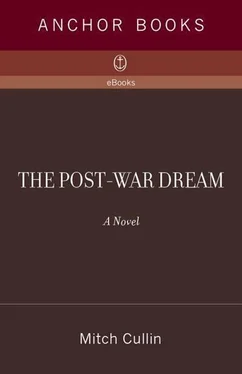Cullin Mitch - The Post-War Dream
Здесь есть возможность читать онлайн «Cullin Mitch - The Post-War Dream» весь текст электронной книги совершенно бесплатно (целиком полную версию без сокращений). В некоторых случаях можно слушать аудио, скачать через торрент в формате fb2 и присутствует краткое содержание. Жанр: Современная проза, на английском языке. Описание произведения, (предисловие) а так же отзывы посетителей доступны на портале библиотеки ЛибКат.
- Название:The Post-War Dream
- Автор:
- Жанр:
- Год:неизвестен
- ISBN:нет данных
- Рейтинг книги:4 / 5. Голосов: 1
-
Избранное:Добавить в избранное
- Отзывы:
-
Ваша оценка:
- 80
- 1
- 2
- 3
- 4
- 5
The Post-War Dream: краткое содержание, описание и аннотация
Предлагаем к чтению аннотацию, описание, краткое содержание или предисловие (зависит от того, что написал сам автор книги «The Post-War Dream»). Если вы не нашли необходимую информацию о книге — напишите в комментариях, мы постараемся отыскать её.
Initial reviews of the novel were mixed, with Kirkus calling it "a misstep in Cullin's unpredictable, adventurous and, alas, frustratingly uneven oeuvre," and Publishers Weekly dismissing the work as "sterile." But subsequent pre-publication reviews from Booklist, Library Journal, and The Denver Post were positive.
In the March 16 edition of the Los Angeles Times Book Review and, simultaneously published, the Chicago Tribune, critic Donna Seaman praised the book, stating: "In this exacting, suspenseful, elegiac yet life-embracing novel, Cullin reminds us that no boundaries separate the personal and communal, the past and present, the false and true."
The Post-War Dream — читать онлайн бесплатно полную книгу (весь текст) целиком
Ниже представлен текст книги, разбитый по страницам. Система сохранения места последней прочитанной страницы, позволяет с удобством читать онлайн бесплатно книгу «The Post-War Dream», без необходимости каждый раз заново искать на чём Вы остановились. Поставьте закладку, и сможете в любой момент перейти на страницу, на которой закончили чтение.
Интервал:
Закладка:
How disconcerting it was, then, for Hollis to feel as if he had never been anywhere but at home; the weeks and months serving overseas in Japan and Korea, the violence and murder which was at once epic and tragically intimate — all of that unfolding around him on a broad scale, altering him forever, while day in and day out the rooms, smells, and aura of the Critchfield house had endured. Aside from the shoebox-shaped package which had arrived ahead of him and now waited on his bedroom floor (shipped by the naval hospital, packed with a set of six ceramic Japanese teacups, a parcel of letters, a few articles of clothing), he found himself entering the room where his belongings felt frozen in time: the plaid comforter folded at the foot of the bed, a stack of National Geographic magazines on a writing desk beside a bay window, the white-and-silver-striped wallpaper interrupted here and there by tacked-up pencil drawings of imaginatively rendered spaceships or airplanes of his own design, the Coca-Cola bottle on the night table which contained a small amount of the beverage he had neglected to finish. Then as if the passing of months hadn't transpired, not even a single day or hour or minute, those familiar belongings seemed to be telling him, “Everything has remained as it was — nothing here has changed for you.”
There was, however, the slight discomfort in his leg as Hollis stretched across the mattress, the uniform covering his body, and the memory of distant terrain and people he wished to dismiss from his mind (not wanting to dwell on anything — where he'd been, where he was now). The white ceiling above his bed remained stained with brownish spots, the result of water damage from two springs earlier in which rain had dripped through the attic and wetted his forehead while he slept. “You're home,” he said tiredly, moving his gaze away from the ceiling, focusing on the gray clouds filling the bay window, as though avoiding something, some internal quandary he hadn't expected would arise. And later he thought, his stare returning to the stains on the ceiling: What on earth am I going to do?
Shutting his eyes, Hollis attempted to push aside the emptiness he was feeling within, to banish the dread he associated with the war and, also, with his own hometown; yet now every single thought suddenly involved one or the other, and as those competing ruminations came and went, the urge to fall asleep and never stir again increased. But shortly before sleep took him, another memory rescued his thoughts, presenting itself like a shimmering oasis in the middle of a hopeless landscape — a pleasant ideality of bamboo walls, miniature Japanese fishing boats, wooden tribal masks, tiki idols, and a multitude of colorful drinks served with tiny parasols; such an assuring, comforting vision it proved to be, lingering there when he stirred from his nap, staying with him during lunch, and, as evening loomed, encouraging him to venture outside so that he might find somewhere which could roughly approximate its hospitable imprint.
Debra smiled at the kitchen table — grinning from side to side, momentarily amused at the idea of him searching for a tropical hideout in Minnesota — while Hollis rubbed at his temple with an index finger, saying, “And so it seemed the obvious answer was to drink, and to keep drinking, from the hour I woke up till I couldn't climb off a barstool or walk myself home at night. Obviously, there wasn't a Zombie Cantina, but we had us the Shelter, and the Rattlesnake Inn, and the Tap Room, and lord knows what else. There wasn't any Rusty Hook or Hunchback's Nipple either, I can tell you that, but there was plenty of other stuff I hadn't tried before. My main beverage of choice became the Mickey Slim, probably because it took me somewhere beyond the ether, sent me higher than a kite and as far from myself and Critchfield as any drink could. Getting drunk like that I didn't think or feel anything, at least anything I'd be able to recall the next morning. There ‘s nothing, I guess, like gin and a splash of DDT to zap you into the stratosphere. Also, my injury didn't flare up or bother me when I was hammered, and the only reminder of the war was my uniform — which I wore for as long as possible, because that way no bartender asked if I was of legal drinking age or not. The uniform alone meant I'd earned the right to throw a few back, and it also was my passport to free drinks. There were always those people who wanted to buy me a round or two whenever I had it on. So I suppose it became my drinking uniform, as it were, and it stayed on my body for weeks, except it didn't ever get washed, and it started to get ratty, smelled pretty ripe, stained by everything I'd spilled on it, not just beer or cocktails but also my own vomit and piss, you name it. Except at some point the uniform got to be too much for even me to tolerate, and so I stripped it off and rolled it up into a ball and set it on fire in the backyard trash barrel one bone-cold afternoon — almost buck naked except for a skivvy, poking at the flaming pile with a stick, and wondering if I'd still be getting free drinks without it. And sure enough, a lot of folks were still kind enough to do me the honor. I mean, for a while there I got a lot of mileage out of being the local war hero, I'm sure a lot more than most other guys got back in their hometowns.”
Hollis fell silent, staring at the untouched platter of veggie kabobs at the center of the table. Suddenly at a loss for words, he reached forward, grabbing his glass of beer, and then he leaned back in the chair while taking several thoughtful sips. Debra remained with her eyes closed — although the grin had now shifted into a thin line of cracked, dry lips. Above them, the ceiling fan droned on, its blades vibrating.
“Naturally, the alcohol melted my reserve, made me glare a bit harder at people, made my mouth move faster than my brain,” Hollis said, resuming in a somber tone as if this realization hadn't previously crossed his mind. “You can imagine the problems it caused between me and Rich, and Rich and my mother. I just wasn't a nice drunk, probably because I was too young and wasn't equipped to handle what the stuff did to me, and I didn't know how to stop once I got going, so the idea of moderation wasn't something I'd understood yet. One or two drinks, I was fine. More than two — and there was always more than two — all bets were off. It's probably a good thing I can't remember everything I said and did, because I'm sure I did and said some awful things. I do know Rich got scared of me, and I know he'd told my mother he didn't want me in the house anymore. But he never wanted me there to begin with. Anyway, he told her it was either him or me. To her credit, though, she stuck by me, ignoring his fake ultimatums. I mean, it was her house and her son after all, and I suppose one of the good things was him staying out of my way most of the time, for whatever the reasons. I guess I had him pretty spooked. To be honest, I think I had me spooked, too. But on those nights when I was passed out somewhere — on the floor of some tavern, or on a bench, places like that — my mother managed to get me home and into my bed, and she never, and I mean never, said a word to me about what I was doing to myself. It's sort of like she understood it, or in the very least she didn't fault me for it. Or maybe she just knew I'd eventually come around, and her patience would help bring me to my senses. Who knows for sure.”
Hollis hesitated — nodding to himself while finishing the last of his beer — knowing that what must be imparted now should be carefully weighed before being articulated; there are the facts of the matter, he thought, and then there is the gist of the truth. “The turning point came early that December,” he said, placing the cup in front of him and clasping it, absently rotating it between his palms. “Maybe it's what they call a moment of clarity, I don't know. Or a breakthrough, right? Because after a hard night of drinking, I woke up in my bedroom feeling like death froze over, and as crappy as I felt it dawned on me I didn't want to feel that way anymore. Plus, I really desired a future for myself, some kind of life outside of Critchfield, and I wanted to fall in love, find that woman of my dreams. I didn't want to be the drunk soldier anymore, or the local hero basking like a wild man in the attention — I just wanted to be Hollis again, except I wasn't at all sure who Hollis really was yet. But there was no way I was going to find myself or escape that town if I got loaded all the time. If I'd kept on like I'd been doing, I knew I wasn't going anywhere but to the nuthouse. It's as simple as that. And the really odd thing was, on that day I decided to turn myself around and clean my act up, I realized my leg didn't hurt anymore, my limp had all but gone away. My mother thought it was a miracle, and I suppose I did, too. It was like I'd walked on water, or something amazing like that. I mean, overnight I was a new man. Even ol’ Rich didn't know what to think, especially since he ‘d been telling Mother it was just a matter of time before I got arrested. He seemed sort of disappointed things didn't end up worse for me. So for a while there it was church every Wednesday evening and Sunday morning, and I avoided the bars, and started reading more and contemplating a steady job, considered aiming for the university — and when I prayed, I always prayed for something to come along and guide me forward, some kind of sign to give me an answer and direct me to where I needed to be heading with my life.”
Читать дальшеИнтервал:
Закладка:
Похожие книги на «The Post-War Dream»
Представляем Вашему вниманию похожие книги на «The Post-War Dream» списком для выбора. Мы отобрали схожую по названию и смыслу литературу в надежде предоставить читателям больше вариантов отыскать новые, интересные, ещё непрочитанные произведения.
Обсуждение, отзывы о книге «The Post-War Dream» и просто собственные мнения читателей. Оставьте ваши комментарии, напишите, что Вы думаете о произведении, его смысле или главных героях. Укажите что конкретно понравилось, а что нет, и почему Вы так считаете.










![Theresa Cheung - The Dream Dictionary from A to Z [Revised edition] - The Ultimate A–Z to Interpret the Secrets of Your Dreams](/books/692092/theresa-cheung-the-dream-dictionary-from-a-to-z-r-thumb.webp)

